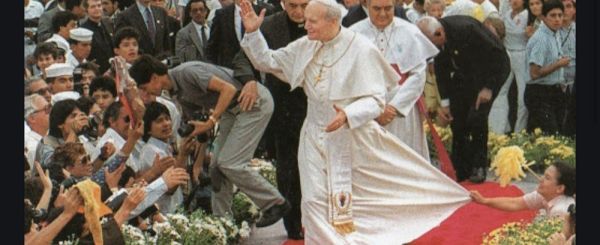Psalm 11[10]
A prayer of trust to the Lord
who is not indifferent to right and wrong
1. We continue our reflection on the Psalms, which comprise the essential element of the Liturgy of Vespers. We have just made ring out in our hearts Psalm 11[10], a brief prayer of trust that, in the original Hebrew, is studded with the holy name 'Adonaj, the Lord. This name echoes at the beginning (cf. v. 1), is found three times at the heart of the Psalm (cf. vv. 4-5), and returns at the end (cf. v. 7).
The spiritual key of the entire psalm is well-expressed in the concluding verse: "For the Lord is just, he loves just deeds". This is the root of all trust and the source of all hope on the day of darkness and trial. God is not indifferent to right and wrong: he is a good God and not a dark, incomprehensible, mysterious destiny.
2. The psalm unfolds substantially in two scenes: in the first (cf. vv. 1-3), the wicked man is described in his apparent victory. He is portrayed in the guise of a warrior or hunter: the evildoer bends his long or hunter's bow to violently strike his victim, that is, the just one (cf. v. 2). The latter, therefore, is tempted by the thought of escape to free himself from such a merciless fate. He would rather flee "to the mountain like a bird" (v. 1), far from the vortex of evil, from the onslaught of the wicked, from the slanderous darts launched by treacherous sinners.
There is a kind of discouragement in the faithful one who feels alone and powerless before the irruption of evil. The pillars of a just social order seem shaken, and the very foundations of human society undermined (cf. v. 3).
3. Now, the turning point comes in sight, outlined in the second scene (cf. vv. 4-7). The Lord, seated on the heavenly throne, takes in the entire human horizon with his penetrating gaze. From that transcendent vantage point, sign of the divine omniscience and omnipotence, God is able to search out and examine every person, distinguishing the righteous from the wicked and forcefully condemning injustice (cf. vv. 4-5).
The image of the divine eye whose pupil is fixed and attentive to our actions is very evocative and consoling. The Lord is not a distant king, closed in his gilded world, but rather is a watchful Presence who sides with goodness and justice. He sees and provides, intervening by word and action.
The righteous person foresees that, as happened in Sodom (cf. Gn 19: 24), the Lord makes "rain upon the wicked fiery coals and brimstone" (Ps 11[10]: 6), symbols of God's justice that purifies history, condemning evil. The wicked man, struck by this burning rain - a prefiguration of his final destiny - finally experiences that "there is a God who is judge on earth!" (Ps 58[57]: 12).
4. The Psalm, however, does not end with this tragic image of punishment and condemnation. The final verse opens onto a horizon of light and peace intended for the righteous one who contemplates his Lord, a just Judge, but especially a merciful liberator: "the upright shall see his face" (Ps 11[10]: 7). This is an experience of joyful communion and of serene trust in God who frees from evil.
Down through history, countless righteous people have had a similar experience. Many stories tell of the trust of Christian martyrs during torment and their steadfastness that kept them firm in trial.
In the Atti de Euplo, the deacon martyr from Sicily who died around 304 A.D. under the rule of Diocletian spontaneously exclaims in this sequence of prayers: "Thank you, O Christ: shield me as I suffer for you.... I adore the Father and the Son and the Holy Spirit. I adore the Holy Trinity.... Thank you, O Christ. Come to my aid, O Christ! For you I suffer, Christ.... Great is your glory, O Lord, in the servants whom you count worthy to call to yourself!... I thank you, Lord Jesus Christ, because your strength has comforted me; you have not permitted my soul to be lost with the evildoers and you have given me the grace of your name. Now confirm what you have done in me, so that the shameless enemy is put to confusion" (cf. A. Hamman, Preghiere dei Primi Cristiani, Milan, 1955, pp. 72-73).
[Pope John Paul II, General Audience 28 January 2004]












